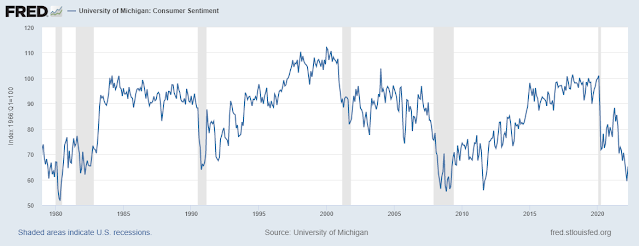Today, two charts that are seemingly telling two entirely conflicting stories.
- When I look at the University of Michigan survey of consumer sentiment making near all-time lows, I think that Americans are morose, discontent and watching their pennies like misers.
Consumer Sentiment Survey
- But then, I look at retail sales zooming and I think Americans are partying like there is no tomorrow.
Which is true? How am I supposed to reconcile these two charts? And, more importantly, is there a hidden message?
Maybe Americans are indeed morose and are drowning their sorrows in shopping therapy. Or, COVID is causing bipolar disorder side effects.
Or, is it the time-tested maxim of "watch what I do, not what I say"?
I vote for the last interpretation, because it fits the larger picture: an unprecedented amount of free, unearned money was thrown to the people within just a couple of months. Money alone didn't make them happy, of course, given the nation's ongoing funk - just look at Trumpism. But, it did give them the free "booze" to go out and parteeeee!!
What's the hidden message? It's this: The free booze is about to be taken away (Fed QT and higher interest rates), and sentiment is certainly not going to improve with gasoline reaching $5 at the pump. How will Americans react? What will they say and do? I think they will say : "enough!, I'm going home" and quit the party en masse.
Human psychology is odd, particularly when it comes to masses. It can turn on a dime, even for the most imperceptible and seemingly unimportant reasons. Like a straw breaking the camel's back, Americans could suddenly go on a buying strike because, say, gas went from $4.95 to $5.


No comments:
Post a Comment